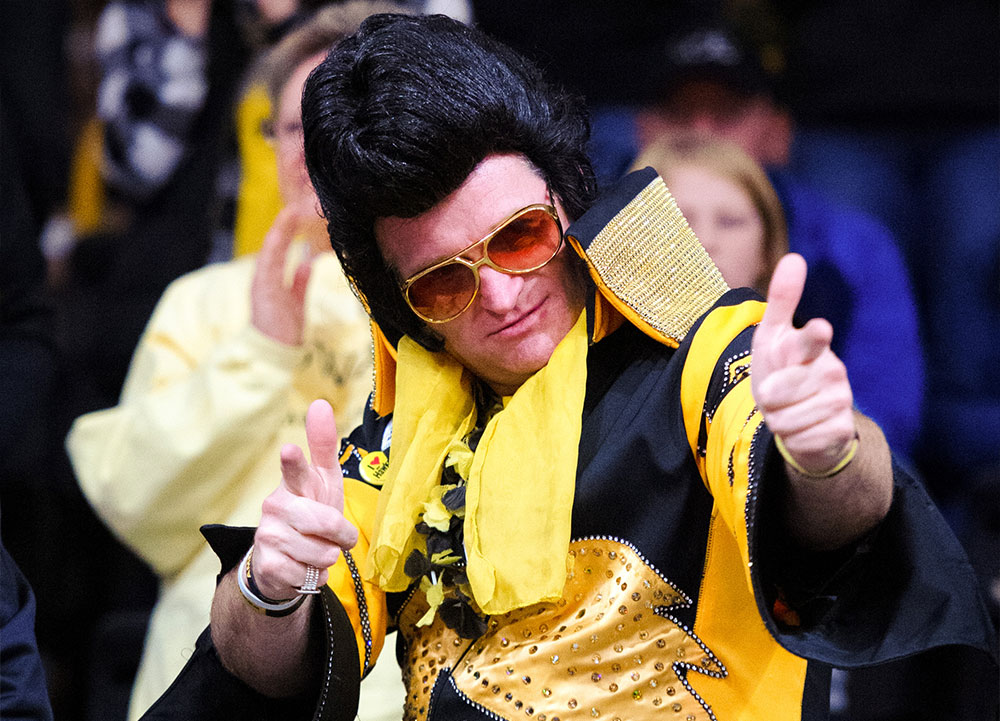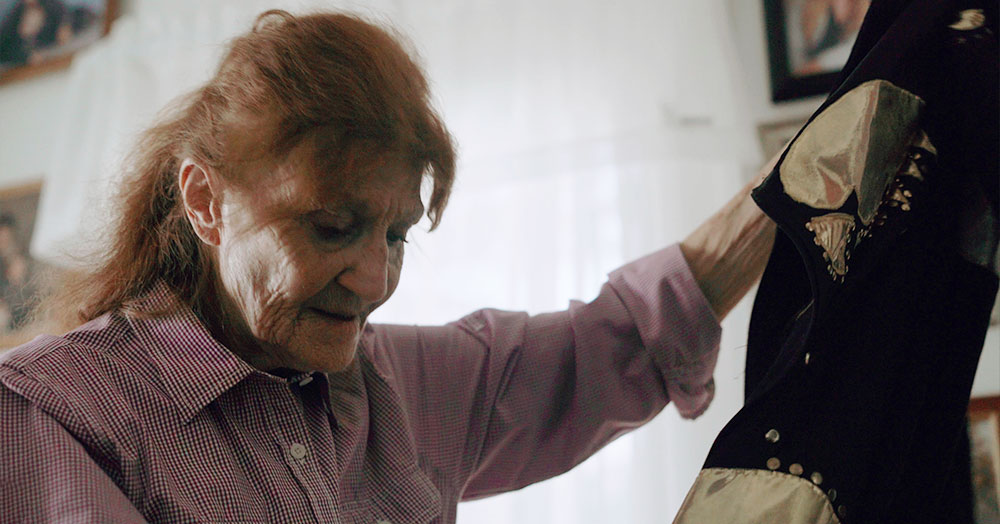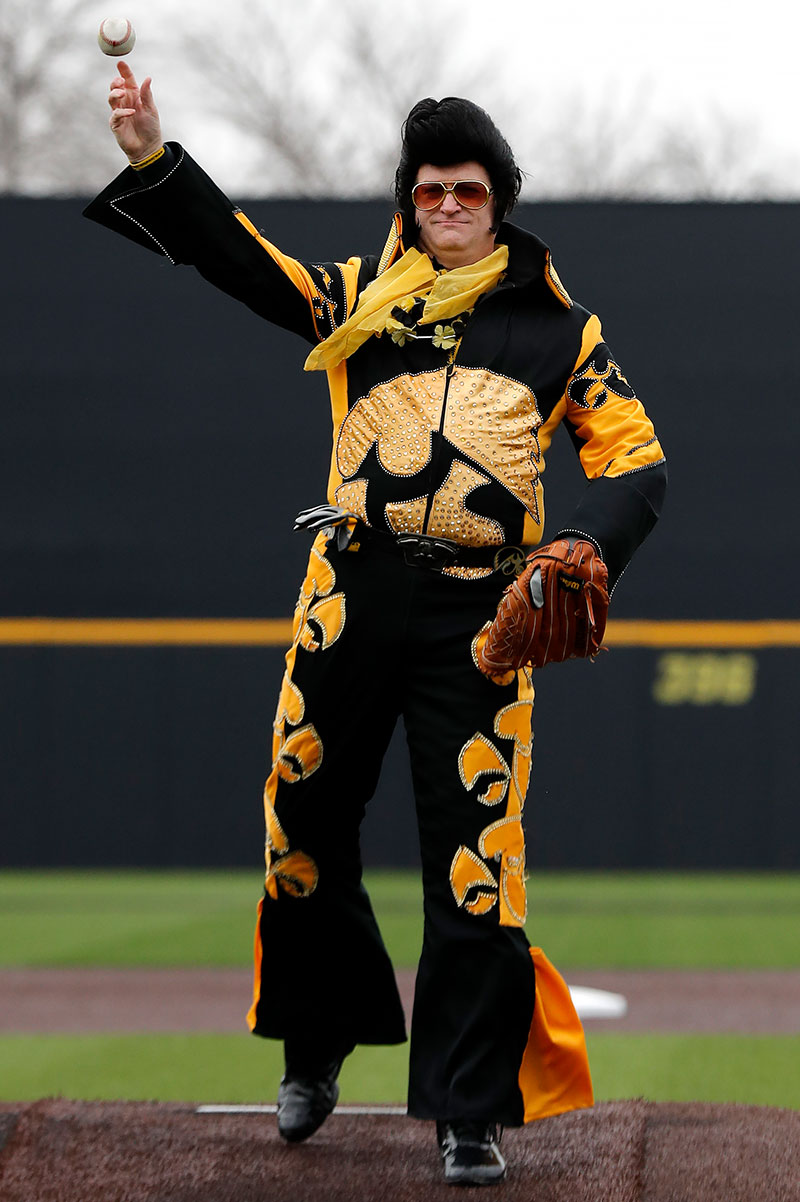New Documentary Goes Behind the Sequins With Hawkeye Elvis
Hawkeye Elvis does it all—sings, dances, takes pictures, and signs autographs. He has been a staple at Iowa football and basketball games since 2010, when he made his first appearance in the crowd at Kinnick Stadium wearing a black-and-gold sequined jumpsuit for Halloween.
 PHOTO: Justin Torner/HAWKEYESPORTS.COM
Hawkeye Elvis offers a glimpse into his game day routine and the special bond he shares with his mother in a new documentary by UI grad Skyler Knutzen.
PHOTO: Justin Torner/HAWKEYESPORTS.COM
Hawkeye Elvis offers a glimpse into his game day routine and the special bond he shares with his mother in a new documentary by UI grad Skyler Knutzen.
Documentarian Skyler Knutzen (18BA) had just one big, driving question for the Hawkeye megafan: What, exactly, leads him to keep coming to Iowa games as the King of Rock ‘n’ Roll?
To find out, Knutzen connected with Hawkeye Elvis’ everyday alter-ego, attorney Greg Suckow. Suckow was enthusiastic about the idea of a documentary. While Hawkeye Elvis has been the focus of plenty of news profiles, both Knutzen and Suckow were excited for the opportunity to tell a different kind of story: one that focused on the person behind the costume.
Suckow then introduced Knutzen to the source of his love for Elvis, the designer of all his costumes, and his frequent companion at games: his mother, Maggie Suckow. Knutzen documented the cheerful banter between the mother-son duo as he followed them to tailgates and Hawkeye football games, into Maggie’s memorabilia-filled Elvis Room, and everywhere in between.
It’s that in-between space that Knutzen hones in on in the documentary, rather than interviews or exposition. “I’m not trying to explain anything,” the UI cinema grad says of his methods. “I’m just showing how things come to be.”
 PHOTO: SKYLER KNUTZEN
Maggie Suckow designed and sewed each of the bejeweled jumpsuits Hawkeye Elvis wears to games.
PHOTO: SKYLER KNUTZEN
Maggie Suckow designed and sewed each of the bejeweled jumpsuits Hawkeye Elvis wears to games.
And on car rides to and from games, breaks from the crowd, and time spent at home—the quiet moments—it’s easy to see: Elvis is a constant through change. As Greg puts it, he and his mother shared “a natural connection” to Elvis’ music while he was growing up. She professes her belief that the King is not dead. And now, as the two of them navigate the beginnings of her journey with dementia, Hawkeye Elvis keeps them close.
 PHOTO: Brian Ray/HAWKEYESPORTS.COM
In addition to his appearances at Iowa basketball and football games, Hawkeye Elvis also periodically throws out the first pitch at baseball games at Duane Banks Field.
PHOTO: Brian Ray/HAWKEYESPORTS.COM
In addition to his appearances at Iowa basketball and football games, Hawkeye Elvis also periodically throws out the first pitch at baseball games at Duane Banks Field.
“I’ve had friends whose parents had [dementia], and it got to the point where their parent didn’t recognize them or know who they were,” Greg says in the documentary. “I hope that day doesn’t come, but I don’t see Elvis ever leaving her memory. He’s too big of a person, too much of a person to forget.”
As it turns out, Knutzen could relate to Greg’s concerns about his mother’s health. While filming the project, Knutzen saw his grandmother struggle with and die from dementia.
“I think that’s why I attached to that storyline so much, because it was going on in my own personal life,” says Knutzen. “It was an opportunity to learn more about my own situation and my own family, and that’s a unique position to be in while you’re making a film.”
The completed documentary, titled Elvis Isn’t Dead, is shared on Nowness, a global platform that promotes high-quality video storytelling. Knutzen is particularly excited about the visibility that Nowness offers, giving the whole world a glimpse into the tight-knit relationships that make up the Hawkeye community. Suckow, for his part, hopes people will see what has motivated him all along—his simple answer to Knutzen’s original question:
“It’s fun. I enjoy doing it. Is there a big, deeper meaning behind it? No. I do it because it’s fun and I like to make people happy.”
This is perhaps even more true than he realizes. Knutzen’s film lets audiences watch as Hawkeye Elvis brings joy to tailgates and stadiums—and as that joy returns to him. In moments big and small, loud and quiet, in the middle of a crowd and with his mother on the car ride home from games, Hawkeye Elvis is having a good time.
